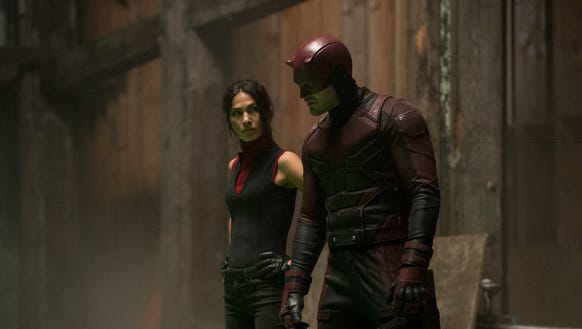| Who ya gonna call? The show wears its blatant love for 1980s pop culture nostalgia on its sleeve, without it ever feeling purely gratuitous or exploitative. |
I thoroughly enjoyed the first season of this great little TV show/love letter to 1980s Spielberg-esque, PG-13 adventure/horror shows. I found the sophomore season satisfying enough, but one that wasn't quite as dazzling or well-constructed as the first season.
At the end of the first season, Will was saved by his three faithful friends from a dark dimension which they had termed "The Upside-Down," a world where some strange type of plant monster seemed to be attempting to break into our own world. Although Will had been pulled out of The Upside-Down, he brought back some tadpole-looking lifeform, which escapes. The young girl, "Eleven" or "Elle," who had inadvertently been responsible for the rift, and Will's subsequent rescue, has gone missing.
In this new season, we fast forward just about ten months, nearing Halloween. The four main boys are mostly trying to live their lives normally, though Will occasionally is visited by strange episodes during which he feels that he is seeing back into The Upside-Down. Not only that, but he sees and feels the presence of a massive, shadowy creature looming over everything. We learn that he's been seeing doctors brought in by the military agency responsible for the troubles during the previous year. We also learn that Elle has been hiding out in Sheriff Jim Hopper's remote cabin in the woods near town. As Elle fight the urge to leave the cabin, Mike, Will, and the other boys who had become her friends work to deal with another round of odd occurrences that spring up around Will's visions and a reptilian lifeform that Justin discovers rummaging through his trashcans. All of these elements come together as the shadow creature from the Upside-Down slowly tries to break into our world.
The characters are still great, and I thought the show did a very nice job dealing with the boys' and girls' budding adolescence. We learn more about Dustin and Lucas, and their somewhat rivalry over the new girl at school, the tomboy Max. I did find Max's older brother, Billy, to be an over-the-top "bad boy" who bordered on caricature much of the time. But the adults are still solid, even if their personal story arcs don't show any particular amount of personal growth.
For the most part, the pacing of the tale was good. Oddly, though the seventh episode seemed highly unnecessary, and featured some rather poor dialogue and acting by Linnea Berthelsen, who plays Kali. I understand the point that Elle needed to rebel a bit and deal with her anger, but this episode seemed clunky and far less entertaining or compelling than those that take place back in Hawkins. It was an odd outlier in a show that had been very tight, and even added an episode to this season.
This was still a good show, and I'll likely tune in for the next season. However, the magic of watching that first season wasn't completely there this time.
Rick and Morty, season 1 (2013)
It's been quite some time since I found a show that made me laugh so hard, so consistently as Rick and Morty.
This was a show that had always been at the top of the "Recommended" list on my Hulu page, but I didn't give it a thought until a close friend with very similar tastes recently sang its praises to me. Roughly ten minutes into the pilot episode, I was completely hooked. By the end of the episode, I was literally in tears from laughing.
This animated show, which airs during the Cartoon Network's late-night Adult Swim hours follows the wild adventures of the title characters. Rick is an inconceivably brilliant scientist who is able to use his inventions to jump between galaxies, alternate dimensions, and other bizarre realms outside of the perception of most mortals. He often brings his none-too-bright, 14-year-old grandson on his far-flung and often extremely dangerous escapades. These might include shrinking Morty down to microscopic size and injecting him into a transient, in order to resolve problems in an amusement park inside the bum's body. Or it could involve the two working their way through a series of Matrix-like world simulations to evade an alien race seeking Rick's powerful technology. The plots are often extremely brisk, multi-layered, and place the odd pair in bizarre scenarios that only an LSD-addled sci-fi savant could dream up. The entire premise is a dream for any fan of science-fiction and fantasy action/adventure books, movies, and TV shows, and the writers are consistently razor sharp.
The final episode of this first season was a great one, wherein Morty's teenage sister Summer and Rick decide to throw their own parties at the same time in the family house, when their parents are away. In the 24-minute episode, we're treated to a hilarious array of teen angst and back-biting happening right along with the gonzo gathering of Rick's various inter-dimensional associates, all of whom are looking to get drunk, high, or whatever it is that aliens and beings from other dimensions do to enter altered states of mind. It's a great representation of so much of what is great about the show: brilliant science-fiction gags, a boatload of events told at a somehow accessible pace, and a few sprinkles of heart here and there.
So I have now quickly become a major fan of this show. I've already dived right into season 2, a review of which is sure to be coming before too long.

